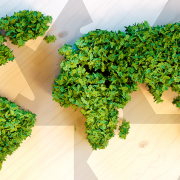A New (Environmental) World Order?
A New (Environmental) World Order?
The Rubble Left Behind
During former United States President Trump’s first and only term, with militant and uncompromising discipline, quick work was made of immeasurable environmental laws and policies. In most cases, little debate or weighing of merits accompanied these initiatives. More often than not, it was “off to the chopping block” for one rule after another. From weakened carbon emission standards for the car industry to minimal environmental review for big, sweeping projects, the oil and gas industry was consulted early and often as the administration’s fossil fuel-centric agenda took shape. Progressive environmental leaders around the world watched in horror as pro-conservation policies were steadily peeled back. The warpath was well-defined and action was swift. Anyone tracking the speed with which the U.S. reversed long-entrenched environmental policies (both domestic and international) couldn’t help but be impressed.
Respected international agreements—notably the Paris Climate Accord—suffered as Trump pulled the U.S. out of the Treaty. Refusing to attend climate discussions held at the 2018 and 2019 G7 meetings, Trump scorned scientific findings and refused to recognize or take action to curb sizable US contributions to world carbon emissions.
Higher Goals
By contrast, throughout his campaign, President Biden made no secret of his intention to champion the environment and elevate the issue of climate change to a national and world priority—if not an international emergency. Biden pledged to mobilize all players to reduce carbon emissions, making this singular goal the primary axis around which the U.S. economy would rotate, create jobs and grow in years to come. All this is detailed in the “Building a Better Future” report. Whether and to what degree elected representatives will support Biden’s plan is still unclear, but the President is ambitious. What he is unable to do initially on a large scale with agreement from both houses of Congress he may tackle on a smaller scale via executive order and shrewd choice of leadership for key cabinet positions. As leader of one of the largest economies in the world, Biden’s action on climate issues can create momentum for change on a global scale. The scene is set, but will the show go on and will the curtain rise…? Here’s where the details count.
Redesigned Spaces for Work and Life
Real change in carbon emissions can’t be done without real change on the ground, which means shaking up the way goods and services are produced and delivered around the world, people move and live, and cities develop and function on a day-to-day basis. The incoming administration understands this, which is why the “Building Better” plan underscores the importance of infrastructure. The physical structures that make up our living spaces—the roads and bridges, urban areas and systems that make it all work—would be redesigned using modern technologies and sustainable design concepts:
- Buildings retrofitted for resilience to floods and rising water,
- The transportation industry remade to accommodate electric cars and trucks,
- Clean alternative fuels.
Roads, highways, and bridges—many in poor and deteriorating condition—would need to be rebuilt to embody innovation, strength and sustainable transportation design and construction in urban and rural spaces alike.
Now science acts as Manager in Chief, cracking the whip in a massive redesign of modern life and culture. China’s economy is already at the center of the world’s solar photovoltaics industry and well-positioned to meet rising world demand for new technologies. Several countries in Europe are already on course to reduce carbon emissions. Norway makes strides to be carbon-neutral by 2030. More than 100 countries around the world aim to have zero carbon emissions by 2050. It is clear from watching environmental disasters unfold across the globe—flooding in India to historic forest fires in the US, to record-breaking storms in the Atlantic and Pacific—that a swift international “reset” is needed. Will this new vision help drive other world economies towards change?
A New Mission for Engineers and Engineering Tools
As much as we want this new world environmental order to kick-in, propelled by clean energy and spitting out clean jobs right and left, many elements need to fall into place to make it happen. With luck, all the working parts—visionary leadership across the globe, political will and international cooperation, and robust funding—will line up as they need to do.
The private sector’s role will be significant if—NO, WHEN—this new world agenda kicks into high gear. Highlands, for one, accepts the challenge. Building resilient infrastructure across the globe will be a non-negotiable mandate of 21st century modern life. Engineering tools need to be flexible, tough, ready to analyze complex (and changing) scenarios, and deliver accurate results. Here’s to new directions for global economies. We as an Indian software company that makes engineering tools for the world’s engineers welcomes the chance to build and modernize world infrastructure. Highlands will deliver, as we always have, when the call to action comes.








